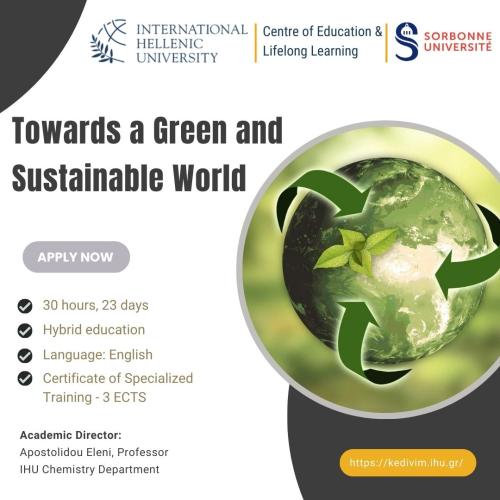05/03/2024 00:00:00 - 12/03/2024 23:59:59
Αιτήσεις κλειστές
Μικτή Εκπαίδευση
Πιστοποιητικό Επιμόρφωσης
Σύντομη περιγραφή:
UNDERGRADUATE STUDENTS OF THE DEPARTMENT OF CHEMISTRY
Πιστωτικές μονάδες: 3 ECTS
Λεπτομέρειες διδάκτρων:
There is no cost fee.
Τρόπος αξιολόγησης των εκπαιδευομένων:
Interim evaluations will take place at the end of each module
Επιστημονικός υπεύθυνος:
ELENI APOSTOLIDOU (Subject: Chemist - Renewable Energy Sources)
Ακαδημαϊκός υπεύθυνος:
ELENI APOSTOLIDOU
Βασικό θεματικό πεδίο:
Θετικές Επιστήμες και Επιστήμες Μηχανικών
Υποκατηγορίες θεματικών πεδίων:
Βιώσιμη Ανάπτυξη
Καινοτόμες Πρακτικές/ Καινοτομία
Οικολογία
Περιβάλλον
Χημεία
Programme's goal
Todays’ environmental challenges are extremely high and of worldwide concern. Indeed, plastic wastes are foundin the Mariana Trench as well as at the top of Mount Everest. More generally, the future of our planet is in danger because of the use of toxic products, suspended particles in air, the global warming and of course,the depletion of oil reserves. This module about“Green Chemistry” aims to enable the acquisition of a collective awareness that participants will be able to value as citizens and future chemistry scientists.
Educational Objectives
Grasp the 12 principles of green chemistry and put them into practice in the laboratory and in daily life,
Develop a critical thinking about the present stateof affairs and of the benefits broughtby green chemistry,
Communicate and exchange ideas dealing with green or sustainable remediation,
Explain and argue about chemical experiments.
Contact Info
elapost@chem.ihu.gr
Teaching Staff
Abou-Hassan obtained his Ph.D. in physical-chemistry in 2009. His Ph.D. was awarded by the French Chemical Society in 2010 with the thesis prize in physical-chemistry. He pursued his training by a post-doc (with H. Möhwald and D. Wang, MPIKG, Germany) in 2010 which provided him expertise in plasmonic nanomaterials and self-assembly. He was recruited in 2010 as an assistant professor in PHENIX laboratory. Since 2010, he has developed his own multidisciplinary research ranging from setting up new synthesis and self-assembly strategies for the elaboration of multi-scale multifunctional materials combining his knowledge in physico-chemical, microfluidics and colloidal chemistry. Fascinated by out of equilibrium phenomena he studies the impact of cells using material science and physical-chemistry approaches on the intrinsic properties of nanomaterials and the auto-organization of oscillating inorganic chemical reactions. In 2016 he defended his habilitation in chemistry (HDR) at Sorbonne University. In 2022, he was appointed full professor of chemistry and junior member of the Institut Universitaire de France.
Giovanni Poli, ORCID orcid.org/0000-0002-7356-1568 studied Chemistry at the University of Milan (1980). After a doctoral program spent between the University of Milan and the University of Geneva, he served as post doc at the University of Lausanne, then again at the University of Milan. In 1992 he became Associate Professor at the University of Florence, and in 2000 Full Professor at the Université Pierre et Marie Curie Sorbonne Université, where he is still currently working. Research interests: organometallic catalysis, step and atom economy in organic synthesis; domino sequences, biomass valorisation, catalytic C–H activation / functionalization.
Franck Launay, ORCID orcid.org/0000-0001-7504-9659, studied Chemistry at the Engineering school of Rennes (1991) and obtained his PhD in chemistry at University of Rennes in 1995. He pursued as a post doc at Texas A&M University (1996) and as temporary teaching and research assistant at University of Grenoble and CEA (1997), then Ecole Normale Supérieure de Cachan (1998). In 1999 he was appointed associate Professor, then professor (2010) at University Pierre et Marie Curie / Sorbonne University, where he is still currently working. Research interests: CO 2 capture and valorisation, lignin reductive or oxidative depolymerisation, epoxidation catalysis using O 2 or H 2 O 2 , heterogeneous tandem catalysis, synthesis and characterization of microporous/mesoporous materials.
Teaching Units - Duration
This first teaching unit (UE) " GREEN LABEL I" aims at enabling students to acquire knowledge about green chemistry concepts and sustainability through self-learning modules comprising online videosand matching
quizzes.
In this teaching unit, students are introduced to:
a) green chemistry: its principles and its indicators;
b) some environmental issues in the field of sustainable development.
The second teaching unit (UE) "GREEN LABEL II" aims at enabling students to diagnose problematic situations and to suggest remedial measures through case studies.
The topics covered include:
a) The calculation of different types of indicators, advanced « green metrics »;
b) Catalysis, green nanomaterials, carbon dioxide recovery, substitution of oil for biomass.
Teaching Units Presentation
Green Label I, 1 ECTS,
Reading and watching autonomously the recommended didactical content: learning clips & articles
Answering quizzes to self-assess the understanding of the presented concepts
Online interaction and discussion through the course’s forum
Green Label II, 2 ECTS
Attend a conference emphasizing the importance of issues raised by green chemistry,
Become familiar with the main indicators introduced by green chemistry,
Analyze three practical situations that will be presented to them during introductory seminars and in videos displaying filmed laboratory experiments,
Develop further reflections on one of the situations, suggesting remedial measures (moving toward greener and more sustainable solutions), or developing further the topic.
Collaborating partners
- Sorbonne Universite



